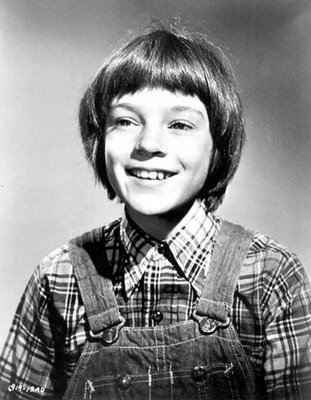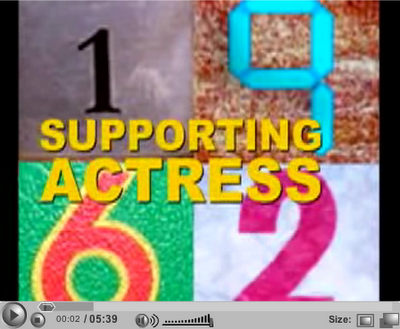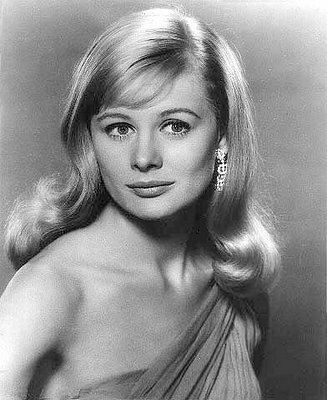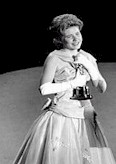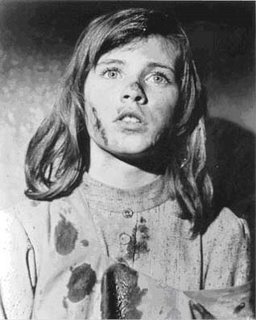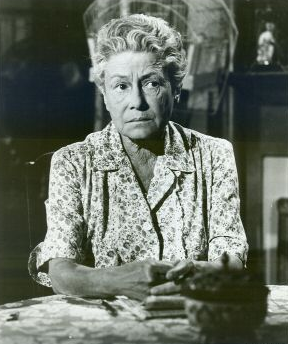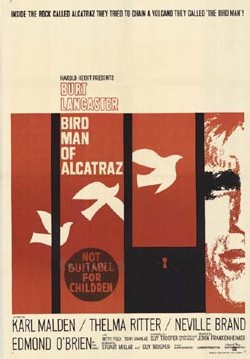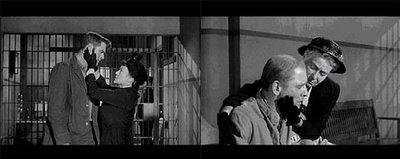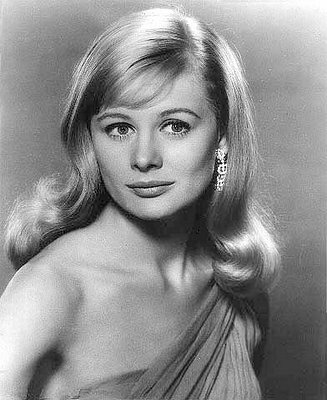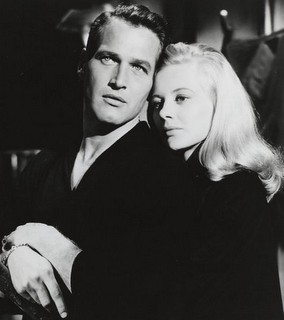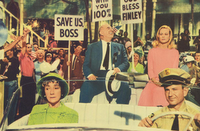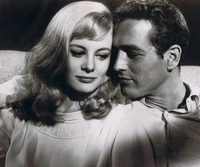 It's always a touch anti-climactic to post a Supporting Actress Sunday profile after the Smackdown. Especially a Smackdown like 1962's, which brought the best NatReel, Canadian Ken and Vertigo's Psycho... But before things proceed any further, one performance awaits its due...
It's always a touch anti-climactic to post a Supporting Actress Sunday profile after the Smackdown. Especially a Smackdown like 1962's, which brought the best NatReel, Canadian Ken and Vertigo's Psycho... But before things proceed any further, one performance awaits its due...Vertigo's Psycho counts................Stinkylulu counts
51:00 minutes of screentime..........................87:30 minutes of screentime
33 scenes..........................44 scenes40% of the movie..........................68% of the movie
Wow. This is the PHD performance for Oscar clockers. She's in almost every scene so far, and it's a science to try to keep track of her on screen time, as well as calculating her number of scenes- there's often no clear "breaks" between scenes (for example, when the kids are outside playing) so it's a judgement call regarding the exact number of scenes she's in (have ten different people look at the movie, and you'll probably come up with ten different answers regarding the correct number).It ain't a sample of 10, but the above sample of 2 got widely divergent counts. (To be fair, after seeing VP's numbers, Lu erred a little on the generous side -- counting both screentime & number of scenes along a "french scene" or call-sheet model, while still counting the trial as one scene & only noting Badham's on-camera time in it.) So, little Mary Badham's actual stats prolly fall somewhere in the in-between...
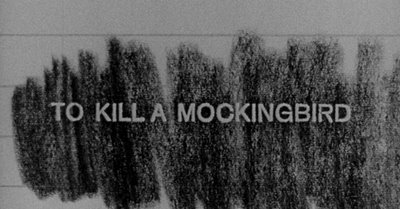
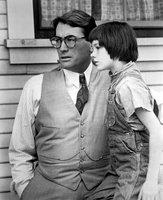 Badham’s performance as Scout in To Kill A Mockingbird presents a curious contradiction. Mary Badham’s natural appeal, simplicity and eloquence have been artfully sculpted into an enduring, effective performance. Badham maneuvers the architecture, the scaffolding, of the role with delicious sweetness, sincerity and agility. She’s even incredibly “present” in each scene. But. Lu’s never convinced that Badham’s Scout is reacting to the world instinctually or spontaneously. In every moment, Badham’s performance shows the thumbprints of others and just never really takes off – never really transcends the specific scene to become a fully inhabited character. Indeed, rather than “acting” Badham seems to be “play-acting”, delightfully so, to be sure, and benefiting from the support of solid pros on every side.
Badham’s performance as Scout in To Kill A Mockingbird presents a curious contradiction. Mary Badham’s natural appeal, simplicity and eloquence have been artfully sculpted into an enduring, effective performance. Badham maneuvers the architecture, the scaffolding, of the role with delicious sweetness, sincerity and agility. She’s even incredibly “present” in each scene. But. Lu’s never convinced that Badham’s Scout is reacting to the world instinctually or spontaneously. In every moment, Badham’s performance shows the thumbprints of others and just never really takes off – never really transcends the specific scene to become a fully inhabited character. Indeed, rather than “acting” Badham seems to be “play-acting”, delightfully so, to be sure, and benefiting from the support of solid pros on every side.  (And please don’t, lovely reader, take this to mean that Lulu thinks kids are somehow incapable of acting at the highest levels. Consider, in this very film, the unnominated Philip Alford who as Jim – with a vivid intelligence, humor and sincerity uncommon for actors of any age – thrills at every turn, very nearly stealing this Mockingbird from both Badham and Peck.)
(And please don’t, lovely reader, take this to mean that Lulu thinks kids are somehow incapable of acting at the highest levels. Consider, in this very film, the unnominated Philip Alford who as Jim – with a vivid intelligence, humor and sincerity uncommon for actors of any age – thrills at every turn, very nearly stealing this Mockingbird from both Badham and Peck.) Badham’s skill and limitations are perhaps on best display in the pivotal scene on the jailhouse steps, in which Scout’s shrewd precocity stops an explosive situation from detonating. Badham’s Scout rises to much of the challenge and the scene’s delicately calibrated tension is heart-stopping. But. Badham just doesn’t hook into Scout’s preternatural savvy, the part of Scout that somehow knows she’s protecting Atticus even if she has no idea how or why. Certainly, StinkyLulu’s hairsplitting here, but the movie is Scout’s to carry and this is the one aspect that Badham’s performance lets fall off the back of the truck. StinkyLulu tends to agree with Scott Heim that, under most criteria, Mary Badham's work as Scout is legitimately among the best performances by kid actors ever, but, in this role and in this film, it's a big something that the performance leaves missing.
Badham’s skill and limitations are perhaps on best display in the pivotal scene on the jailhouse steps, in which Scout’s shrewd precocity stops an explosive situation from detonating. Badham’s Scout rises to much of the challenge and the scene’s delicately calibrated tension is heart-stopping. But. Badham just doesn’t hook into Scout’s preternatural savvy, the part of Scout that somehow knows she’s protecting Atticus even if she has no idea how or why. Certainly, StinkyLulu’s hairsplitting here, but the movie is Scout’s to carry and this is the one aspect that Badham’s performance lets fall off the back of the truck. StinkyLulu tends to agree with Scott Heim that, under most criteria, Mary Badham's work as Scout is legitimately among the best performances by kid actors ever, but, in this role and in this film, it's a big something that the performance leaves missing.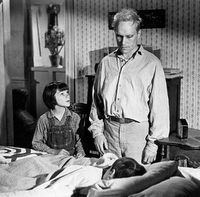 That said, StinkyLulu just adores Badham's work in the film's other hardest scene & is convinced that Badham's performance is what makes it one of the all-time brilliant scenes in kid-actor history. (If only StinkyLulu could find a picture of this scene...) Indeed, Mary Badham’s work as the Ham, after the Macon County Pageant, does it all. Starting as a silly sight-gag before effortlessly pivoting to natural sibling banter to abject terror to pained poignance – all in the space of a few minutes and encased in papier-mache? That’s good work, kid, and the Ham scene works mostly because Badham's totally game for whatever the script throws her way.
That said, StinkyLulu just adores Badham's work in the film's other hardest scene & is convinced that Badham's performance is what makes it one of the all-time brilliant scenes in kid-actor history. (If only StinkyLulu could find a picture of this scene...) Indeed, Mary Badham’s work as the Ham, after the Macon County Pageant, does it all. Starting as a silly sight-gag before effortlessly pivoting to natural sibling banter to abject terror to pained poignance – all in the space of a few minutes and encased in papier-mache? That’s good work, kid, and the Ham scene works mostly because Badham's totally game for whatever the script throws her way.A worthy performance, worthy of a nomination even. But, for StinkyLulu, the verdict's still out on whether Badham's performance as Scout should have been considered Best Actressing or Best Supporting Actressing. The fact that the film's narrative is told from Scout's POV seems to tip it toward the lead, but even then... Ah, the sweet mysteries of Supporting Actress -- they do keep unfolding.
*****

